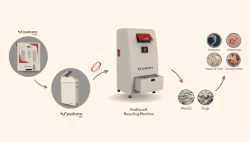Padcare Labs Private Limited
Eco-friendly menstrual waste management solution

CURRENT IMPACT

Geographical Focus
- Maharashtra, Kerala, Tamil Nadu, West Bengal, Delhi, Chandigarh, Gujarat, Telangana

Potential Impact
- Establish
2
recycling centres - Provide
1 Million
women with access to sustainable menstrual pad disposal facilitiesRecycle 5 million pads - Eliminate
~2,20,000 kg
CO2 emissions

Ajinkya_Dhariya, Founder and CEO, PadCare Labs

The SAMRIDH program arrived at a critical juncture for PadCare, providing vital financial support that sustained our operations and fueled our expansion ambitions. With the team’s dedicated guidance, we navigated the program seamlessly and achieved notable milestones. This partnership fortified our business and harmonized with our mission to foster a circular economy by promoting sustainable menstrual hygiene solutions.

Samridh support
SAMRIDH is supporting Padcare through a recoverable grant to advance sustainable menstrual waste management solution, contributing to a healthier planet and empowered communities. With this financial assistance, Padcare aims to establish 2 new recycling centers in Delhi and Bangalore to recycle 5 million sanitary pads/year, reducing 220,000 kg of CO2 emissions in 6 months. This will enable Padcare to safe and environmental friendly menstrual hygiene waste disposal facility for 1 million women/month, and improve the working conditions and livelihoods of waste pickers through training and employment. Additionally, under this collaboration Padcare will work towards community outreach, partnerships with NGOs and healthcare providers, and strategic deployment of disposal units. It will also raise additional commercial capital to scale its operations, creating a 20x leverage on the funds committed by SAMRIDH.
26%
Of the global population, representing ~800 million females, menstruate each day [1]
121m
Indian women use disposable sanitary napkins, collectively generating ~113,000 tons of menstrual waste annually [2]
1.5m
To 4 million waste pickers pick up, clean, sort, and segregate recyclable waste in India [3]
In India, the widespread use of disposable sanitary napkins generates substantial sanitary waste. Inadequate practices in waste collection, disposal, and transportation lead to improper disposal and environmental hazards. Waste pickers, who play a critical role in managing this waste, often face undignified working conditions and physical risks due to a lack of protective gear, exposing them to harmful pathogens. Improving menstrual waste management is crucial for both environmental sustainability and safeguarding the dignity and health of these workers.
[1] “The Link Between Menstrual Health and Overall Well-being: A Comprehensive Guide.” n.d. Ujaas Engineering Lives. https://www.ujaas.in/blogs/the-link-between-menstrual-health-and-overall-well-being-a-comprehensive-guide#:~:text=Worldwide%2C%20there%20are%20approximately%201.8,first%20period%20after%20hitting%20puberty .
[2]Vidya Pratap, Arunima K V, Vidya Pratap, and Arunima K V. 2023. “Menstrual Hygiene Matters for Ecology.” Deccan Herald. June 9, 2023. https://www.deccanherald.com/opinion/menstrual-hygiene-matters-for-ecology-1226108.html .
[3] Swetha Dandapani, and Swetha Dandapani. 2021. “Unpaid and Undervalued, How India’s Waste Pickers Fight Apathy to Keep Our Cities Clean.” The News Minute. May 27, 2021. https://www.thenewsminute.com/delve/oppressed-and-unrecognised-life-waste-pickers-crucial-india-s-sanitation-72426.


Padcare Labs, offer India’s first sustainable menstrual hygiene service, managing everything from collection to disposal. They provide special bins in public washrooms for safe, hygienic disposal and install vending machines with affordable sanitary pad options. Its patented recycling technology, PadcareX, converts used pads into pulp and plastic within 20 minutes, recovering 99% of materials. The pulp is used for hygiene products, and the plastic for construction and packaging. Padcare Labs aims to serve 1 million women while improving conditions for over 100 waste pickers exposed to harmful pathogens. Its efforts also align with Sustainable Development Goal 13, which focuses on combating climate change. Additionally, it has been recognized by Forbes, the World Economic Forum, FICCI-ISC, and NASSCOM for its innovation.
Key Stakeholders


